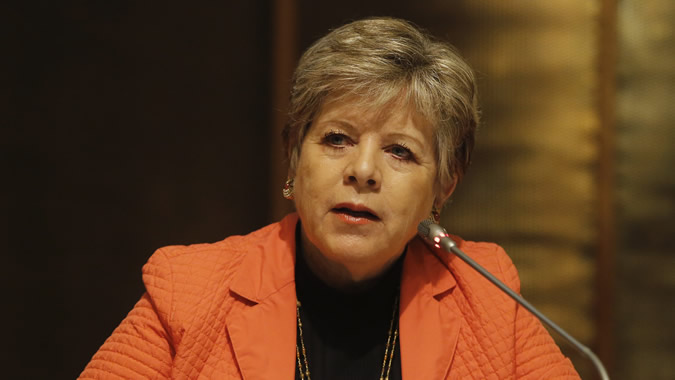Alicia Bárcena Highlights the Role of the Region’s Institutional Architecture in the Lead-up to the Post-2015 Agenda
ECLAC’s Executive Secretary participated in New York in a dialogue organized by the Economic and Social Council (ECOSOC) of the United Nations.

The Executive Secretary of the Economic Commission for Latin America and the Caribbean (ECLAC), Alicia Bárcena, emphasized in New York that Latin American and Caribbean countries have a solid regional and sub-regional institutional architecture, which includes this organization and its subsidiary bodies, to support the implementation of the post-2015 development agenda, which will be approved in September.
Alicia Bárcena participated on July 9 in a dialogue of Executive Secretaries of the United Nations Regional Commissions about the transition towards the Sustainable Development Goals (SDGs) and their implications on a regional scale. The gathering was organized by the Economic and Social Council (ECOSOC) and was moderated by Juan Somavía, Special Adviser to the Secretary-General on Interregional Policy Cooperation.
“The regional dimension is a central element because it constitutes a bridge between global and national levels,” the Executive Secretary underscored with regard to the role of the United Nations Regional Commissions, which include, in addition to ECLAC, the Economic and Social Commission for Asia and the Pacific (ESCAP), the Economic Commission for Europe (ECE), the Economic Commission for Africa (ECA), and the Economic and Social Commission for Western Asia (ESCWA).
Alicia Bárcena emphasized that ECLAC, because of its holistic and multidisciplinary vision, will be able to give integrated responses to the challenges posed by the 17 Sustainable Development Goals (SDGs) and contribute to the creation of a regional architecture for its follow-up and monitoring.
In addition, she indicated that the subsidiary bodies—of which she mentioned the Statistical Conference of the Americas, the Regional Planning Council of the Latin American and Caribbean Institute for Economic and Social Planning (ILPES), and the recently created Regional Conference on Social Development in Latin America and the Caribbean—can play a key role in facilitating that transition with technical and sectoral dialogues among countries in the region. She also cited the work of various intergovernmental forums, including the Regional Forum on Sustainable Development, which is in the process of consultations for its creation and will be able to play an important role in terms of coordination.
In this sense, she called for the strengthening of regional commissions so they can continue with this work and pay attention to the needs of their member countries with regard to the development agenda.
Within the regional architecture, ECLAC’s Executive Secretary also valued the role of organizations such as the Community of Latin American and Caribbean States (CELAC), the Union of South American Nations (UNASUR), the Central American Integration System (SICA), and the Caribbean Community (CARICOM), as well as sub-regional development banks, such as the Inter-American Development Bank and the CAF-Development Bank of Latin America.
At a national level, Alicia Bárcena praised the efforts that Latin American and Caribbean countries are making, particularly on development planning, which allows officials to connect short-term objectives with a strategic medium- and long-term vision; on strengthening national statistics institutes, which are the main producers of the data that will allow for follow-up on the specified goals; and on the participatory mechanisms that involve a plurality of actors in the implementation of the new development agenda on a national and local level.
Regarding this point, she indicated that the main objective and ethical guiding principle of this new agenda in Latin America and the Caribbean must be equality, expressed in its economic, social and environmental dimensions. In this way, that new agenda must allow for countries to move from a culture of capital to that of work, from the culture of privilege to that of equality, and from the culture of extraction based on natural resources to that of sustainability with intergenerational solidarity.
Finally, Alicia Bárcena warned that, unlike during the previous decade, Latin America and the Caribbean faces an adverse context today that puts at risk the economic and social achievements made, which means that these transformations will require greater efforts to be able to make progress on this agenda with less fiscal room and more arbitration between public policies and institutional strengthening.
The Executive Secretary also held a meeting this Thursday with the ambassadors of Latin American and Caribbean countries accredited at the UN, in which she spoke about the implementation of the post-2015 agenda in light of the new global scenario, which she said should be implemented under the principle of common but differentiated responsibilities.
ECLAC’s most senior representative also indicated that a complementary financial architecture to link national, regional and global levels is needed, along with an international pact that favors equitable mechanisms for facilitating trade and technology transfer.
Related content
ECOSOC dialogue with the executive secretaries of the United Nations regional commissions
Statement by Alicia Bárcena, Executive Secretary of ECLAC.
Country(ies)
- Latin America and the Caribbean
Contact
Public Information Unit
- prensa@cepal.org
- (56 2) 2210 2040